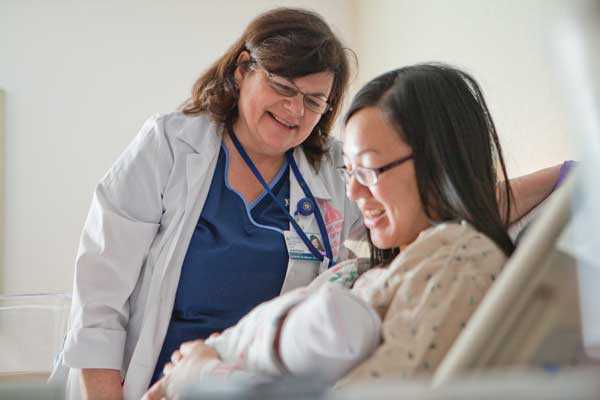Lactation Specialists Offer Help
by Whitney L. J. Howell

Whether it’s her first child or third, breastfeeding can be difficult for any mother. When something just isn’t working right, Deborah Dixon, BSN, RN, IBCLC, or one of her five board-certified colleagues steps in.
As The Johns Hopkins Hospital’s (JHH) lactation consultant coordinator, Dixon helps mothers and babies master breastfeeding or use supplementation strategies. Since arriving in 2007, she’s enhanced the lactation support program to assist mothers with low milk supply.
“We always prefer human milk to formula, so I introduced evidence-based information about supplementing at the breast to obstetricians, midwives, and neonatologists,” she says. “Now, we’re the state’s only hospital with a specified supplemental feeding policy.”

JHH lactation specialists complete 20 hours of basic breastfeeding training through courses offered twice annually. In addition, Dixon mentors one nurse toward international board certification in lactation every semester and accepts lactation consultant interns from other education programs.
Under Dixon, the number of breast-feeding mothers has skyrocketed. Previously, only 26 to 42 percent of mothers at JHH initiated breastfeeding. Today, thanks to seven-day-a-week lactation coverage, between 60 and 92 percent do so.
Dixon also collaborates with JHH’s pediatric nurse practitioners to establish specific feeding plans. Recently, she and pediatric nurse practitioner Suzanne Rubin, DNP ’11, MPH, MS ’97, CRNP-P, devised breastfeeding plans for late preterm infants and infants with hyperbilirubinemia.
Lactation guidance isn’t limited to post-delivery days. Mothers can attend bi-monthly prenatal breastfeeding classes. After birth, lactation specialists also call mothers at one-week, one-month, and three-month intervals to assess progress. Weekly new-mother meetings also let women discuss concerns.
Lactation specialists offer free consultations to all JHH staff members too. “If a new mom is having a problem, she can make an appointment to see us,” Dixon explains. An employee pump room within the Hospital is also available.
“We’ve made a huge impact,” Dixon says. “We’re teaching moms to let babies lead the dance. It makes breastfeeding so much easier.”